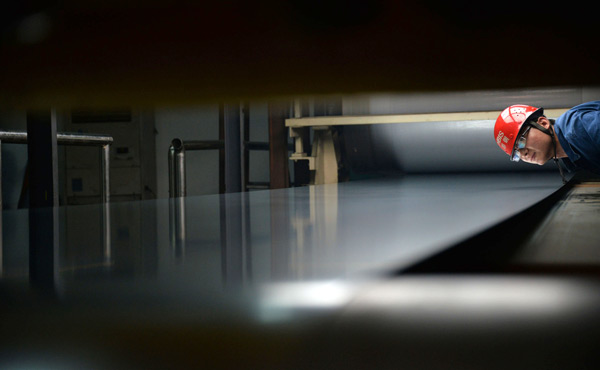 |
|
A technician checks steel plates at a Han-Steel Co Ltd unit in Handan, Hebei province. [Hao Qunying/For China Daily] |
They said both sides have already set an excellent example in solving solar panel disputes and consultation has brought the relationship back on track; the method should be used to find solutions over excess steel capacity, which they say is a "global phenomena."
Europe's steelmakers are facing closure or a drastic reduction in jobs, with trade unions blaming China for dumping cheaper steel products on the open market.
Since last year, the European Union has repeatedly resorted to defensive trade measures, seeking to impose punitive tariffs against China's various competitive steel products, though such products have helped reduce the cost of business in Europe amid economic stagnation.
A solution "very much depends on whether the EU is prepared to intensify negotiations with China and its companies on best accounting practices and cost measurement," said Rolf Langhammer, vice-president of the Kiel Institute for the World Economy in Germany from 1997-2012.
Referring to the consultations in the solar panel dispute in 2012-13, Langhammer, who is still a professor at Kiel, said there have been examples in the past in which Chinese companies constructively cooperated with the EU Commission and thus prevented anti-dumping duties being imposed on their exports.
"This would be a good way to go," he said.
Langhammer insisted that bilateral relationship would strongly benefit from a clear policy of the Chinese government to abstain from any trade-distorting subsidization policies in favor of their steel plants.
Beijing rejects the allegation that China has offered incentives and subsidies to encourage steel producers to export. Spokesman of Ministry of Commerce Shen Danyang ruled it out at press conference last month, saying "China has not injected export subsidies for the steel companies."
Men Jing, professor at the College of Europe, also expressed her concern over Brussels' actions of imposing excessive trade protection measures against China's steel exports and its time-consuming decision-making process of granting China market economy status, which European Parliament will debate on Tuesday.
"I have sensed that, if two sides could not cope with the two headaches properly, the tit-for-tat actions, which I don't expect, may bring trouble for the bilateral relationship between China and EU, which just celebrated their 40th anniversary last year," said Men.
"However, I don't think the relationships between China and the EU member states, between China and Central and Eastern European countries, will be affected," said Men. "Their relationships have gathered sound momentum."
Fredrik Erixon, Director of the European Center for International Political Economy (ECIPE), a world-economy think tank in Brussels, said trade disputes were never welcome, but both sides know that they would be damaged if such disputes were allowed to spiral out of control and lead to trade wars.
"The important thing is to prevent escalating trade defense measures and to keep up the pace on concluding the bilateral investment treaty between China and the EU," said Erixon.
"The political reaction is likely to be highly critical, perhaps leading to retaliation by the Chinese government on European exports."
"As long as global growth remains muted, the demand for steel will be below capacity, and forecasts suggest overcapacity will remain a problem for several years," Erixon said.
Langhammer said overcapacity in steel is a global phenomenon which can be primarily explained by declining demand for raw steel in many emerging markets, including China, and by difficulties in rapidly adjusting supply volumes.
China is responding by closing steel plants, but this will not decisively cure the problem. "Nor will Brussels anti-dumping measures be of permanent help," said Langhammer.
To contact the reporter: fujing@chinadaily.com.cn